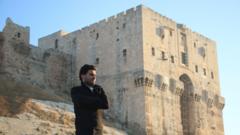Abdulkafi, an English teacher from Aleppo, experienced a heartfelt reunion with his 85-year-old father for the first time in years, mere days after rebels executed a significant offensive, overtaking the northern city from government forces. “He never dreamed he would see me again before he died,” Abdulkafi expressed, reflecting on a video capturing their emotional embrace. Since the takeover by the armed rebel group Hayat Tahrir al-Sham (HTS) and its allies, residents report being treated respectfully by the fighters, with improvements in utilities like electricity and water. However, the shadow of renewed war lingers, as many locals voice anxiety regarding HTS’s moderate promises and the threat of returning hostilities.
The United Nations announced that tens of thousands have fled amid the recent violence, with individuals seeking anonymity for safety concerns. Reports from the Syrian Observatory for Human Rights indicate that airstrikes have resumed, resulting in civilian casualties. One resident revealed a pervasive fear of bombardment, prompting extreme caution, such as discouraging family members from visiting nearby shops.
Aleppo, once Syria’s commercial center, was heavily impacted during the civil war, and while it had seen relative calm since its recapture by government forces in 2016, the risk of escalating conflict remains real. The Syrian government has been accused of severe human rights violations, including torture and unlawful killings, in areas under its control.
Despite the joyful reunions like Abdulkafi's, many in Aleppo express deep-seated fears. Abdulkafi noted how some relatives hesitate to associate with him due to potential reprisals from the regime. “Nineteen Eighty-Four is applied in Aleppo," he remarked, drawing parallels from George Orwell’s novel to describe the pervasive fear instilled by the Assad regime's presence.
HTS, originally founded as Jabhat al-Nusra and linked to al-Qaeda, has since distanced itself from its past and asserts a more moderate stance. However, human rights organizations warn against its authoritarian practices, including the mistreatment of critical voices. Residents describe an atmosphere of apprehension; while some express cautious relief over the absence of government troops, distrust remains regarding HTS’s longevity in power.
Maria, a local woman, voiced her anxiety: “People are confused and scared,” she said, sharing her initial reluctance to leave home. “Everyone looked scared and anxious. No one looked comfortable.” A male resident, Mohammad, recounted an encounter with militiamen who assured him of safety, albeit with a hint of scrutiny regarding his sister's attire.
In conversations with political analysts, concerns regarding minority safety emerged, particularly among Christians who have been cautious about HTS’s intentions. George Meneshian indicated that, despite initial promises of non-interference, historical precedents of persecution loom large.
Abdulkafi argues that HTS, desiring global acceptance, may demonstrate flexibility towards minorities. “They are showing much more flexibility… This doesn’t mean that I like them,” he clarified.
As Aleppo stands at a crossroads, the struggle between hope and despair continues amidst the uncertain political landscape sculpted by war.



















